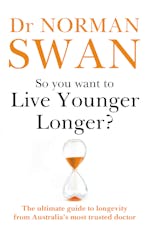.png?auto=compress&w=1040&h=380&fit=crop&fm=jpg)
Here's what you can do in your 30s, 40s, and 50s
MONDAY 25 JUL, 2022Here’s what you can do at any age, from Australia's trusted, straight-talking doctor and broadcaster Dr Norman Swan.
Your 30s and 40s
Don’t smoke burnt plants (do I really need to explain why again?).
If you’ve got kids, encourage them to continue in education as long as they can. The more you’re educated, the longer you live and the later you develop dementia.
If you’ve got kids, make sure they’re fully immunised, including to hepatitis B and human papillomavirus (HPV), both of which are anti-cancer vaccines.
Find a GP you like and stick with them. You need someone who knows you and cares about your health with a laser focus.
Women should continue in cervical cancer screening. No bottle of supplements is going to match screening to prevent you dying prematurely of an avoidable cancer.
Know what your cholesterol levels are – the good (HDL) and the bad (LDL). A high LDL in your 30s can indicate you’re already silting up your arteries and need to lose weight (lowers unhealthy fats), change your diet and up the exercise (raises HDL). If your cholesterol is really high, you may have a genetic problem and need medication.
Know what your blood pressure is. There’s nothing like a constant battering from high blood pressure to age your brain, heart and kidneys prematurely and leave you open to life-shortening heart attacks, strokes and dementia. If your blood pressure is getting beyond normal levels, then lose weight (can have the equivalent effect of a blood pressure med), exercise for 45 minutes to an hour of moderate intensity most days of the week (also reduces blood pressure), lower your alcohol intake or switch to low alcohol drinks, and reduce your salt intake.
Don’t sit on symptoms like bleeding, bruising, unplanned loss of weight or new onset of pain just because you’re young.
Your 50s
All of the above, plus breast and bowel cancer screening.
Keep eating a very diverse diet … Don’t allow it to become narrowed down because you can’t be bothered. That’s what tends to happen as you get older.
Same goes for exercise. You’re now entering the time of life when your muscles – if you don’t work on them – get weaker and smaller. If anything, you should be upping the amount and intensity (carefully tuned to your capacity and level of fitness).
Keep your abdominal fat as low as possible as measured by your waist circumference.
Look around you and assess how many people you can call upon if you need help or support. Now’s the time to maintain and work on family and friendships rather than take them for granted. Social interaction and support are central to staying young.
At age 50 there are five factors which predict a longer life in health:
a BMI between 18.5 and 24.9
30 minutes or more per day of moderate to vigorous exercise
alcohol intake in line with official recommendations
a high quality diet (e.g. Mediterranean)
never smoked
Women who have none of these factors live just over 23 years more free of diabetes, heart disease or cancer; men get 23.5 years. Women who have four or five of these factors live 34 years free of these diseases; for men, it’s 31 years extra.
Related news
 loading...
loading...
Start reading The Librarians of Rue de Picardie
Read an exclusive extract! From the bestselling author of THE PARIS LIBRARY.
 loading...
loading...
The Richell Prize Celebrates its Tenth Anniversary Year
Announcing the opening of entries for The Richell Prize 2024.
 loading...
loading...
Mum loves books this Mother's Day!
 loading...
loading...
Start reading Small Hours by Bobby Palmer
Start reading Small Hours by Bobby Palmer
 loading...
loading...
Meet Susannah Begbie, 2022 Richell Prize Winner
It's the 10th anniversary of The Richell Prize - hear from the 2022 winner.



.png?auto=compress&w=150&h=60&fit=crop&fm=jpg)


.png?auto=compress&w=150&h=60&fit=crop&fm=jpg)


